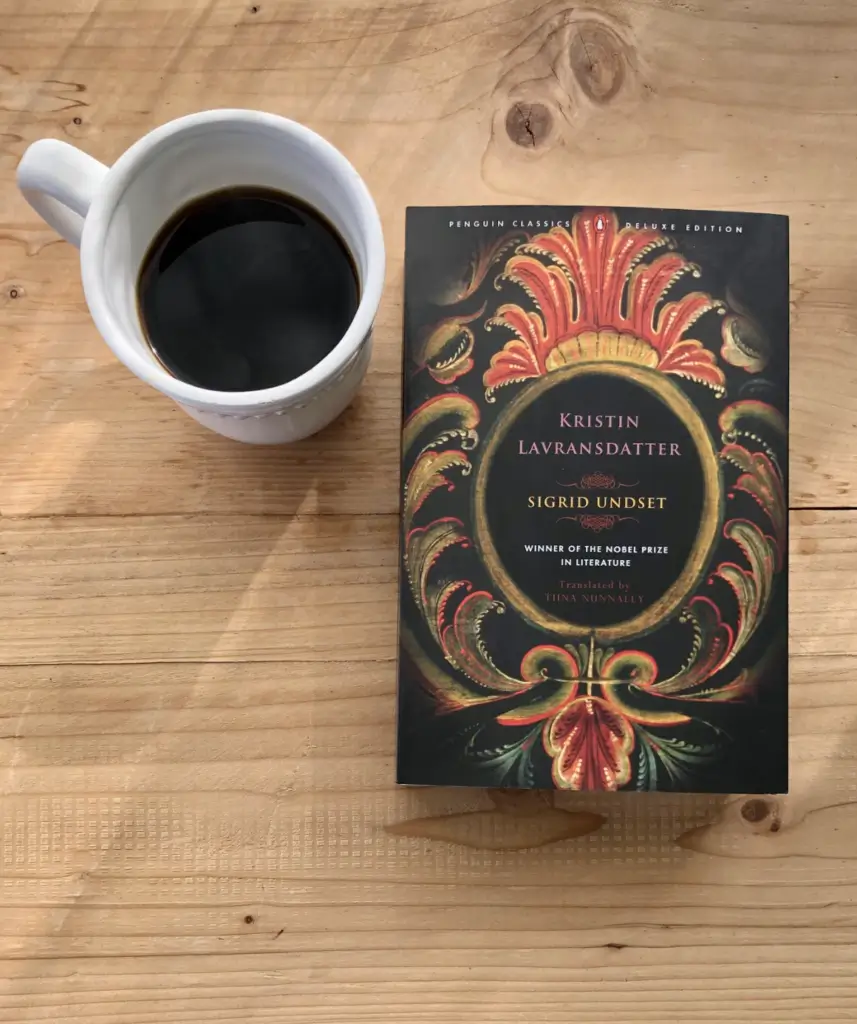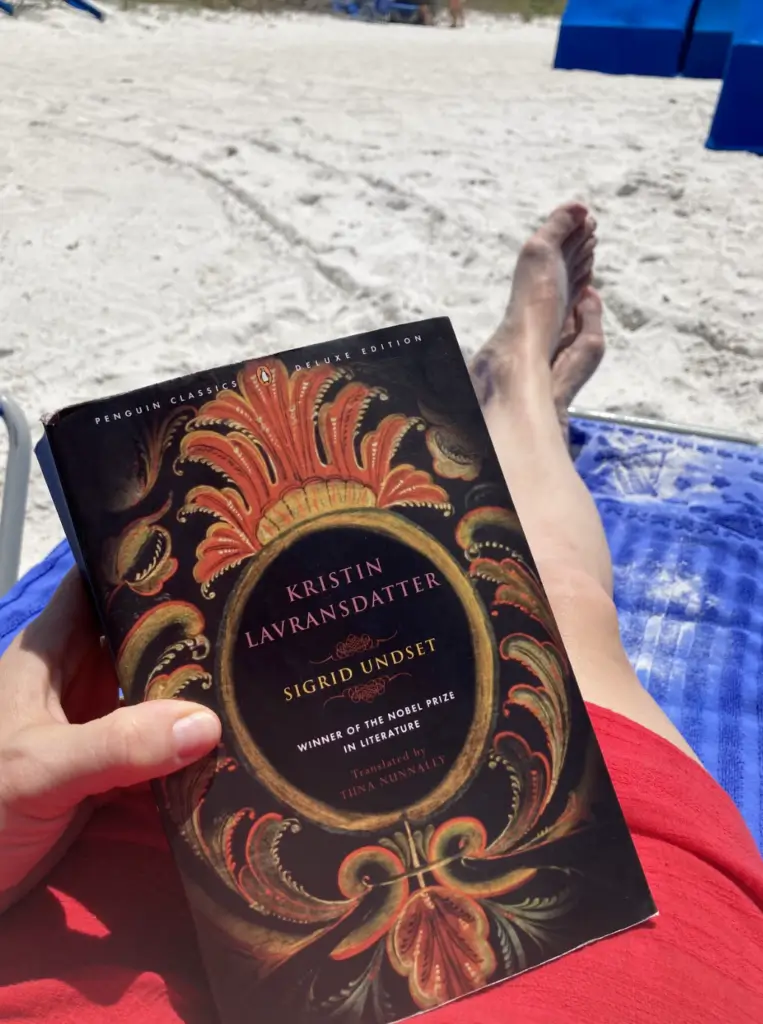Illumination of the Soul Through Kristin Lavransdatter
Written by Megan Keyser
As an ardent lover of literature, I have long been selective in my reading choices. Subsequently, I have encountered countless exceptional works communicating wisdom, truth, and beauty with surpassing skill. Occasionally, however, a novel does even more than that: it sears my very soul. I now count Kristin Lavransdatter, by Sigrid Unset, among such priceless works.
This riveting spiritual odyssey of a medieval Norwegian woman—a story woven with astounding intricacy and marked by raw sincerity—somehow bridged space and time, speaking to my inmost heart. As I thrilled over this work and wrestled with its weighty subject matter, I lamented that, for nearly forty years, I had denied myself the incomparable insight offered by this masterful work. But then again, perhaps there is a reason we encounter certain pieces of literature at specific junctures in our own life’s odyssey.

The profundity and power of the written word in shaping characters and souls, influencing thoughts and opinions, and awakening imaginations and consciences, never ceases to amaze me. As I have previously mentioned, the antics and growth of Anne Shirley in Anne of Green Gables fashioned my girlhood, as her unconventional ways, boundless ambition, and love of beauty sparked my desire to strive for virtue and loveliness in all aspects of life. As a young adult, I empathized with Sense and Sensibility’s Marianne Dashwood, whose passionate conviction and burning, sometimes misapplied, desire to discard artifice and insincerity won my youthful appreciation. While I admired her enthusiasm and intensity, her sister Elinor’s superior self-possession and long-suffering spirit ultimately provided a warranted check to my fevered impulses (which I had thus far foolishly assumed were governed by indisputable “sense”). And as I recently sat in my car, with tears streaming down my face, finishing the final pages of Kristin Lavransdatter, I realized that this was “my moment” for experiencing this matchless work.
Honestly, this work is peerless, striking on many poignant matters with majestic insight and depth. While Undset touches on a variety of topics with outstanding historical scholarship and superb literary style, what sets her work apart is its utter realism. Undset’s impeccable gift for accurately capturing the intimate struggles and complexities of human relationships, in all its convoluted and perplexing glory, creates the timelessness of Kristin’s story and enables a modern reader to empathize with the medieval heroine’s triumphs and travails easily. Hence, as I read Kristin’s saga, it felt as though Undset was, in countless ways, holding a mirror to my own life, illuminating the capricious and shadowy workings of my soul with brilliant clarity.
At the heart of this novel is the dual reality of the predictability of sin and the juxtaposed necessity of forgiveness. In Kristin Lavransdatter, forgiveness, or the lack of it, has profound and lasting implications for individual souls, communities, and families, either facilitating or destroying harmony by its presence or, conversely, its scarcity. Nowhere are the devasting effects of prideful stubbornness more vivid than within the tumultuous marriage of Kristin and Erlend. While many gentler souls may find the determination of these lovers, passionate in their ardor yet unbending in their wills, baffling, I discovered that it was a sobering and moving examination of the damaging effects of pride and a misguided sense of justice. Considering the boundless love and continual forgiveness extended to her by her father, Lavrans, Kristin’s limited capacity for forgiveness seems incomprehensible. In her rebellious youth, Kristin unflinchingly inflicted grief and anguish upon her most loving father, pursuing her desires at the expense of his happiness and, ironically, her own. Yet though Lavrans was justifiably distraught and even angered over his daughter’s imprudent, harmful, and willful actions, he nevertheless coupled his sense of justice with unquenchable mercy.
Kristin, however, did not emulate her father’s sublime gentleness when confronting her husband’s offenses. Why is this? What separates the virtue of the father from that of the daughter? In a word, his piety allows Lavrans to truly understand his relationship to God, as both a humble servant to his Sovereign Lord and as a faithful son to a devoted Father (Modern Catholic Dictionary, Father John Hardon). This perception provides Lavrans with an accurate understanding of sin. While it might trample our happiness or well-being, sin is not so much an assault against our individual person as it is a defiant insult to our Creator. Kristin herself recognized this, noting, “Her father’s marvelous gentleness was not because she lacked a keen enough perception of the faults and wretchedness of others; it came from his constant searching of his own heart before God, crushing it in repentance over his own failings” (page 939).
Yet, though Kristin acknowledged her father’s elevated spirituality, she could not imitate it. Instead of conquering her inflated view of self, she criticized and condemned her husband rather than forgiving him for his inattentions, indulgence, and imperfections. Indeed, her assessment of his actions was not unwarranted (it is undoubtedly true that, in innumerable ways, Erlend’s actions recklessly violated her happiness, peace, and esteem), but the trouble is that, instead of offering forgiveness, Kristin, with bittered soul, chose to judge Erlend’s heart mercilessly. Kristin’s refusal to extend the same forbearance and magnanimity her father presented to her is tragically ironic but typically (and miserably) human. Unfortunately, the cost of this unrelenting indignation—”the hard little anger that lay at the bottom [of her heart]”—is the safety of their mutual and eternal happiness (260).
Kristin’s stony silence, her vehement frustration and brooding anger, mainly when Erlend falls short of the ideals she’s fashioned as a result of her unparalleled father and cherished upbringing, reverberated in my heart—most likely because her tendencies are all too familiar to me. Her resentfulness toward the man she loved made me catch my breath: “Kristin clenched her teeth in the dark. She would not beg him. If he remained silent [to her needs], then she would remain silent too…hour after hour they lay there in this way, and each one knew the other was not asleep…Then she allowed her tears to fall as they would, from sorrow and hurt and shame” (309). My husband has never hurt me or betrayed me as Erlend frequently hurt Kristin, yet how many times, with heel-digging stubbornness and pride, have I met my husband’s shortcomings or our disagreements with brittle frigidity or silent fuming?
Kristin’s stony silence, her vehement frustration and brooding anger, mainly when Erlend falls short of the ideals she’s fashioned as a result of her unparalleled father and cherished upbringing, reverberated in my heart—most likely because her tendencies are all too familiar to me.
Megan Keyser
Additionally, I recognized that I, like Kristin, am rarely frustrated with the slights of neighbors or acquaintances and can often extend forbearance toward them. However, when it comes to loved ones, I frequently employ an unflattering harshness in chastising or examining faults with minute precision, “It was odd; [Kristin] had never noticed before that [Erlend] walked slightly crooked. Before she had only seen that he had long, slender legs and narrow ankles and small, well-shaped feet” (260). My tendency to take insensitive words or arguments deeply to heart, my inflexibility in pursuing my preferences, and my struggle to overlook offenses or camouflage hurt feelings (because it violates my sense of justice and honesty) were all mirrored in Kristin’s volatile temperament. And then I wondered: If I can hardly bear minor “injustices” against myself, which truly pale in comparison to those suffered by Kristin throughout her marriage, what does that say about my moral fragility in the face of disappointment and frustration?
Many readers may struggle to understand what could drive two individuals so passionately in love, to bitterly oppose each other as Kristin and Erlend so often did in their self-centered quest to be “right.” How many of us do this very thing in our lives? We meditate on the notion of forgiveness and speak words of mercy in our prayers, but when our spouse, child, or parent wounds us, how readily do we extend compassion? Like Kristin, I recently found myself questioning the sincerity of my prayers when I struggled to honestly recite the Act of Contrition in my heart one evening because I could not master my reproachful and embittered soul. How can I hope to pray with even a shred of worth if the words themselves deny my innermost sentiments? Kristin’s thoughts, therefore, haunted me, eliciting tears from my eyes, “…She could not [forgive], because she would not…when she stood before the cross, whispering the Pater Noster, and she came to the words sicut et nos dimittibus debitoribus nostris, then she would feel her heart harden, the way a hand clenches into a fist to strike. No! Without hope, her soul aching, she would weep, for she could not make herself do it” (940-941). Fiction can indeed be frighteningly real.
Yet, for all the terrible anguish stemming from Kristin and Erlend’s mutual obstinacy, Erlend’s heedlessness, and Kristin’s icy wrath, the redemption of Kristin’s soul reverberates with even greater intensity. By bearing the effects of sin—suffering and heartache, death and destruction—Kristin finally learns to surrender her pride and relinquish herself, her husband, and her children all into the Hands of God, thereby finding redemption for her soul. And she finally understands that, however meager our human efforts, however lukewarm our devotions, God hears our feeble cries, ” Haven’t you realized yet that He will hold up each soul as long as that soul clings to Him?… God has helped you each time you prayed, even when prayed with half a heart or with little faith, and He gave you more than you asked for” (1094-1095). Perhaps our weaknesses, humiliations, and our crosses are mysterious blessings in our path to Salvation, for these difficulties compel us to cry out to our Lord for assistance and “…hold on to the cross with all [our] strength…cling[ing] to it like a kitten hanging on to a plank when it falls into the sea” (36). Perhaps without the trials, sufferings, and consequences of our sins, we would haughtily fail to recognize our utter dependence upon God: a tendency Kristin battles her whole life to overcome, even in the culminating moment when she is struggling to extract a rotting corpse (a symbol of her sinful self) from its prison and carry it to the redemption of holy ground, ” I wonder how you [Kristin] thought you would manage to do this all alone…I think it’s about time for you to say a few prayers,” Ulf Haldorsson chides (1117).
So, it may be that the humbling reflections we encounter in our literary mirrors are reasons to rejoice rather than causes to lament. Particularly if we embrace a vital message of Kristin Lavransdatter echoed in 2 Corinthians 12, “My Grace is sufficient for you, for power is made perfect in weakness,” we may find that our weaknesses become our greatest strengths. We may struggle to humble ourselves and forgive and long to seek our way. Still, if we ask God to dismantle our pride—thrusting out our hands and hearts to Christ Crucified—we can fully appreciate the mystical reality that “nothing [we] do could ever change [our] father’s heart toward [us]” (253). His love abides.

About Well-Read Mom
For our Tenth Anniversary, the reading list put together by Well-Read Mom reflects on the theme of family. In Well-Read Mom we desire to create a place for women, not to escape from family life and work, but to experience a kind of leisure through friendship and literature so that women can return to their lives with a renewed vision and vigor. By reading books together, we help sustain a tradition of reading, which is a gift not only to our families but to the world. We hope you’ll join Well-Read Mom for our Year of the Family. Find out more.


